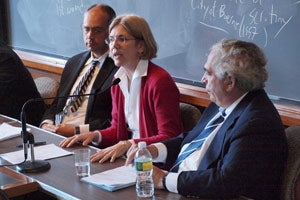A group of Harvard Law School professors gathered on Sept. 29 for a panel discussion on the year-old global economic crisis and the prospects for recovery.
Moderated by Professor Howell Jackson, the panel included HLS Professors Allen Ferrell ‚95; Elizabeth Warren, chair of the TARP Congressional Oversight Panel; and Hal Scott, director of the Program on International Financial Systems, and Visiting Professor Geoff Miller of New York University Law School. The panelists sought to identify the causes of the spiraling downturn that began in September 2008 and the structural changes that have resulted and are still needed.
All four panelists agreed that the crisis has eased somewhat—the stock market has strengthened and the American economy is showing signs of emerging from the recession. Scott reminded the audience that a year ago “we were on the verge of complete economic collapse.”
Miller observed that the crisis was unlike others in U.S. history because the institutions that ran into trouble first—including Lehman Brothers, AIG, and Bear Stearns—were not banks in the ordinary sense of the word but “had become like banks without our knowing it or being aware of it. We now know that we have a quasi-banking financial sector that we didn’t before and we have to come to terms with what to do about that.”
In analyzing how the crisis came about, panelists pointed to a variety of causes and culprits.
Warren criticized the regulatory structure itself as inadequate, characterizing financial regulations and regulators as a hodgepodge of federal and state administrative entities whose operating budgets come from the institutions they regulate: “How do you compete? You don’t compete by saying, ‘We’re going to enforce the regulations.’ You compete by saying, ‘We’re going to enforce fewer regulations than those other guys.’”
Warren also blamed Congress for tearing “holes in the regulatory fabric,” financial institutions for “taking advantage of every tear in the fabric,” and the press for failing to perform its watchdog function.
“This was a crisis that was the result of a bubble,” Miller said. “Crises don’t just happen on their own; they happen when you have a financial bubble, and this bubble was the result of grotesque mismanagement of monetary policy by the Fed.”
Miller criticized Greenspan’s decision to keep target interest rates so low for more than a year “for no reason that has ever been provided.” The result, he said, was massive credit thrown into U.S. and world markets.
“When you have that much credit, it’s going to find its way to the sea. It just happened to find its way to the sea through the river of sub-prime mortgages. If it hadn’t been sub-prime mortgages, it would have been commercial real estate or something else,” Miller said.
But Scott reminded Miller and other panelists that in assessing Greenspan’s performance, hindsight might be 20/20. “Before we lynch Alan Greenspan, I think we should recall that there was a huge consensus in this country to promote housing. What would have happened to Alan Greenspan if he’d said, ‘Here’s a bubble and I’m crushing it.’”
On what the future holds, the panelists agreed that it is uncertain at best.
“One thing I am sure of is that five years from now the regulation of financial institutions is going to be significantly different than it has been,” said Miller. He also predicted that more calamity may be coming, saying that people knowledgeable about the commercial real estate market have told him it will be the next domino to fall and that the impact will be at least as bad as the sub-prime collapse of a year ago.
